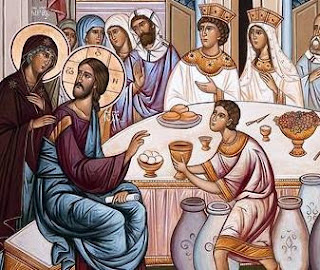RCL Epiphany 2C
19 January 2025
Church of the Epiphany
Surrey BC
For the first ten years of our life in Canada my family attended St Anselm’s on the University Endowment Lands. When our older son, David, was about four or five, the Parish decided to change the brand of communion wine we had been using. So, for a period of a month or so, we used a different brand of wine every Sunday.
It was David who brought the wine-tasting to an end. He went up for communion as he always did, received the bread and then the wine. After he received the wine, he turned to face the congregation, wiped his hand across his lips and, in a very loud voice, announced, ‘That was great!’ David, having pronounced judgement, we had a new wine for the eucharist.
I couldn’t help but think of this story when I read the gospel for today. It is a familiar story to all of us. It even ends in a similar way to St Anselm’s search for new communion wine: “When the person in charge tasted the water that had become wine and did not know where it came from (though the servants who had drawn the water knew), that person called the bridegroom and said to him, “Everyone serves the good wine first and then the inferior wine after the guests have become drunk. But you have kept the good wine until now.” (John 2.9-10 NRSVue).
The good wine comes when the guests least expect it. Ordinary first-century wedding catering practice is turned upside down, and the extraordinary wine comes at the end rather than at the beginning.
In the religious traditions of the Celtic peoples of Britain and Ireland there is a concept called ‘thin places’. ‘Thin places’ are moments in time or locations where our ordinary world touches the extraordinary world that exists just beyond our senses. We can sense the presence of the extraordinary and we are drawn to it.
But these extraordinary moments and places are firmly rooted in the ordinary. We see a child rejoicing in the taste of good wine and unexpectedly find ourselves sitting with Jesus at a wedding feast in Cana of Galilee. We hear someone reading a familiar biblical text and unexpectedly discover ourselves sitting near a loved one telling us a family story. We see a stranger in a shopping mall whose clothing and way of walking remind us of a loved one who has died and unexpectedly that loved one joins us for a brief moment.
Thin places are the work of the Holy Spirit. This work of the Spirit is not unusual. The Spirit is constantly at work in the ordinary moments and places of our lives, filling these moments and places with the potential to be encounters with the extraordinary beauty of the world as God desires it to be.
What the Spirit does with the moments and places of our lives, the Spirit also does with people, including ourselves. Paul knows this when he writes to the Christian community in Corinth. He encourages them to recognize in the gifts each one brings to the life of the community the work of the Holy Spirit. All of these ‘ordinary’ signs of God’s activity in their midst are also signs of the ‘extraordinary’ reality of our unity as human beings made in God’s image. For Paul the Christian community is a ‘thin place’ where God reveals one of the mysteries of faith – that we are all mutually interdependent and that diversity is not a curse but a gift that nurtures and enriches human life.
For Paul an important dimension of his ministry is to open the eyes of the disciples of Jesus – both those to whom he is writing and to us who hear his words today – “I do not want you to be ignorant”, he writes (1 Corinthians 12.1b NRSVue). It is possible to fail to recognize when God’s ‘extraordinary’ draws near to our ‘ordinary’ moments and places, when God’s very self comes to us in the face and form of a familiar person or even a stranger. When we “are wearied by the changes and chances of this life” (BAS 132), our senses become dulled, and thin places seem far and few. But they have not disappeared; they are only obscured when our “dull senses” are not looking for the light that the Spirit of God is continually beaming upon us (Common Praise #637, v. 4).
My friends, all around us the ordinary waters of our daily lives hold within them the extraordinary wine of the reign of God. Even five-year-old children can sense its presence. May we be open to the quickening of the Spirit, so that we can drink deeply and find renewal, hope and the courage to persevere.

No comments:
Post a Comment